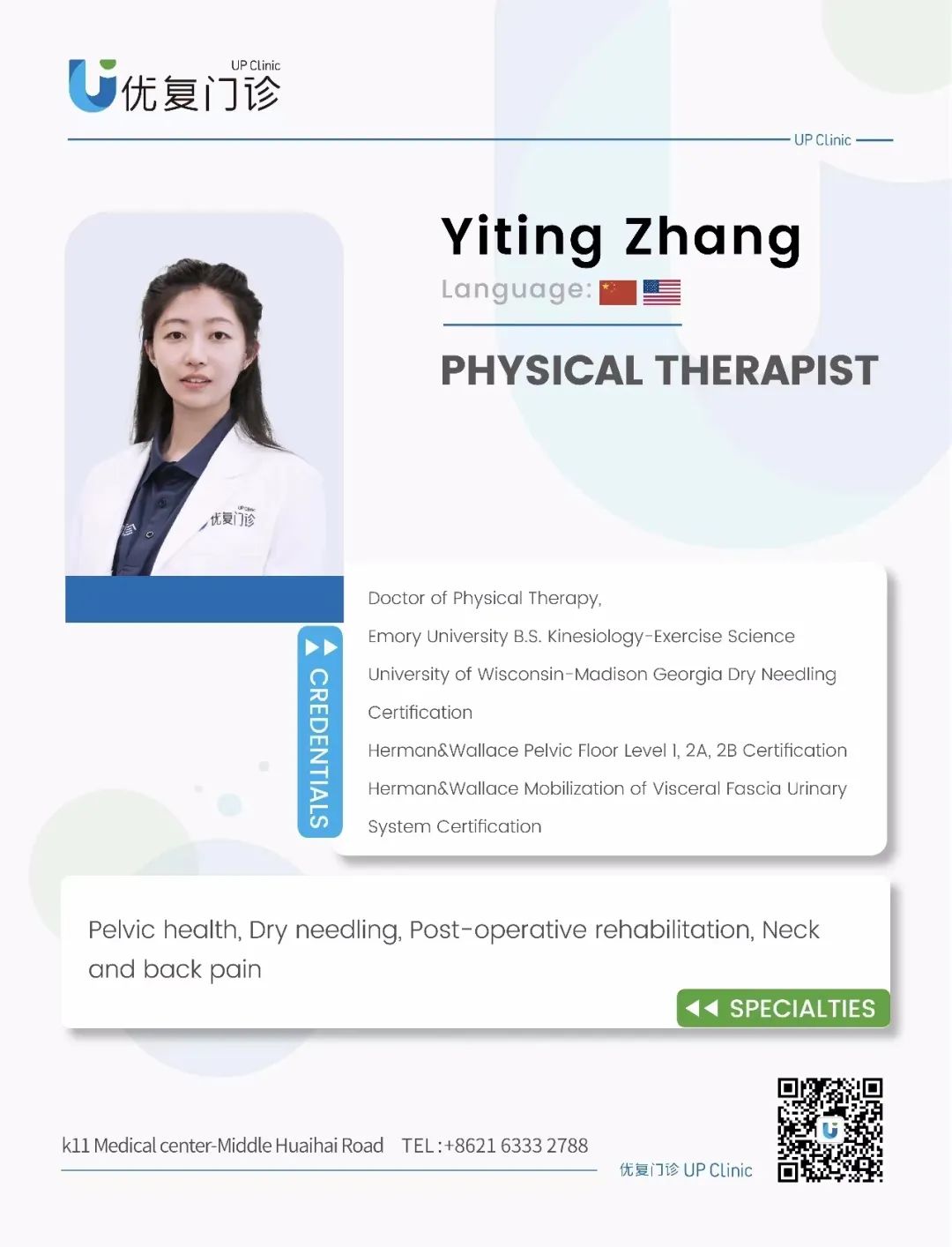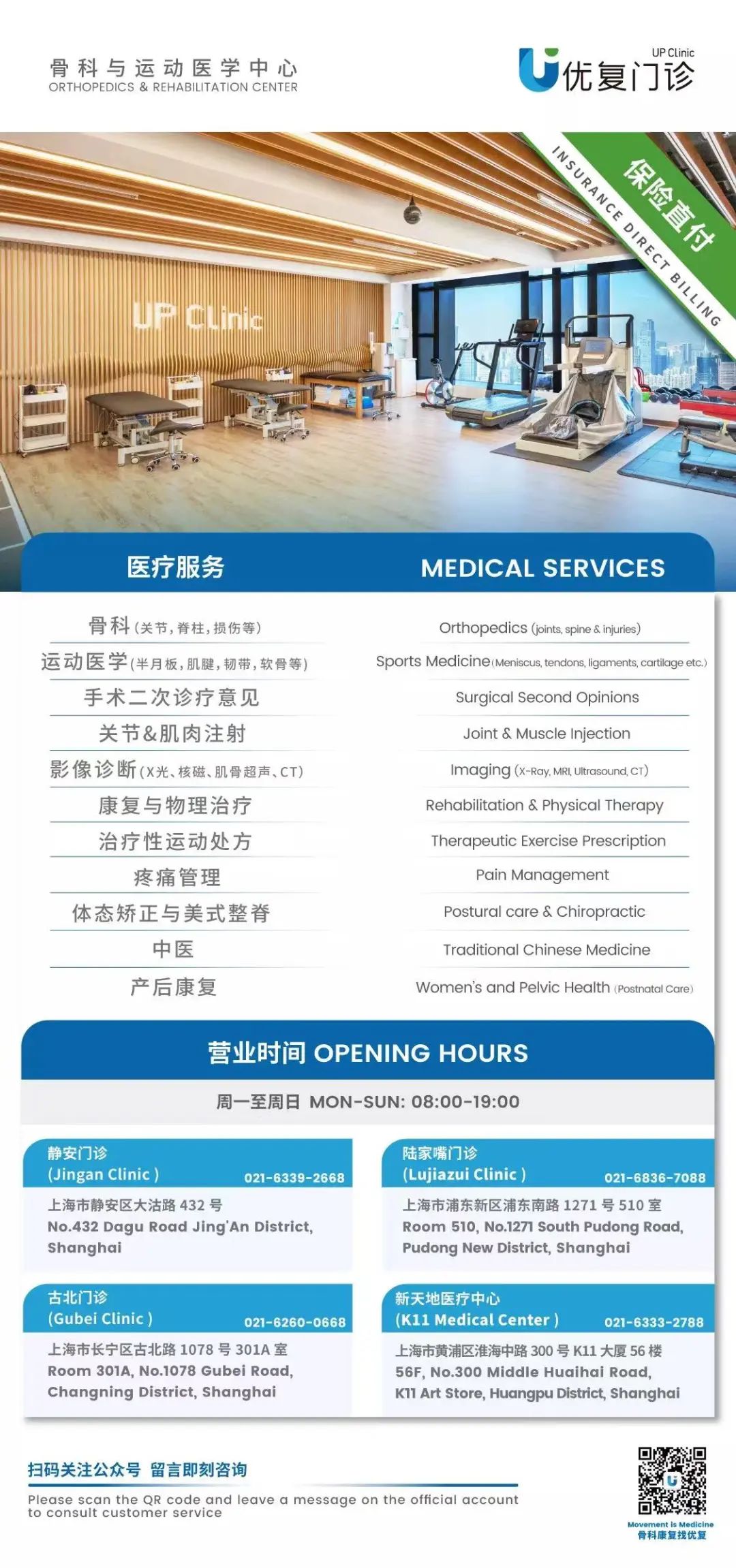Why it’s important to prioritize pelvic health



Meet Yiting Zhang, one of our orthopedic physical therapists who specializes in pelvic health, especially the female pelvic floor, urinary and bowel dysfunction and pelvic pain. She is also licensed in dry needing, which she has found helpful for patients with chronic pain and muscle tension.
Author | Lauren

Originally from Shenyang, Liaoning, Yiting moved to the United States where she studied at Wisconsin-Madison, and later Emory University to complete her DPT (Doctorate of Physical Therapy). A book-lover, cyclist and cook in her spare time, she also enjoys trying new activities in her spare time, such as archery and Pilates.
Along with her personal enjoyments, she is also passionate about her field of study and speaks on why it’s important to learn more about physical therapy, specifically pelvic health, and how having a pelvic health exam can be beneficial – for both men and women – to help manage pain and discomfort in many areas of the body, not just the pelvic floor. Read on to learn more about this specific type of physical therapy, why it’s important and how Yiting recognizes the importance of creating a comfortable setting for the patients she works with.
1
Why are you passionate about physical therapy?
What led me to pursue a career in physical therapy was being a patient myself. In college, my physical therapist helped me tremendously to decrease my pain, learn more about my own body, and get back to my normal daily activities. The experience inspired me to learn more about the human body and how to work with [my body] to achieve better function. Becoming a physical therapist has allowed me to help my patients to learn more about their own bodies, rebuild the mind-body connection, and use this knowledge to help them improve their lives along the way.

2
Why do you think it’s important to be seen for
pelvic health?
Pelvic health is still a developing field in healthcare. Many people, even healthcare professionals, aren’t familiar with how to work and support their patients pelvic health needs. Some patients may also feel ashamed to talk about their pelvic floor-related symptoms to their family, friends, or even their doctors. They don’t want to be laughed at or told “it’s not a big deal”.
This is where a pelvic health physical therapist can step in to support. Someone who understands their situation and wants to use their professional knowledge to help the patients to achieve their goals, is willing to listen to their needs and can provide support and guidance for the patient’s priorities.
3
Who would benefit from receiving a pelvic health exam?
Every new mom should get a pelvic health evaluation at least six weeks after delivery to facilitate their healing process and prevent future pelvic floor dysfunctions. I’ll give you one example: I was working with a mother of three children: ages 8, 11 and 16. She came in recently for worsening urinary incontinence and when I asked when the symptoms first started, she looked at me with surprise, saying “It started after I had my oldest daughter. Isn’t that normal – all women start to leak a bit after they have a kid?”
I explained to her that having pelvic floor symptoms after childbirth is common, but it’s not normal. In the following four months, we went through a long process of activating and strengthening her pelvic floor muscles, as well as working on her hip flexor pain and lower back pain along the way, which is related to her pelvic floor symptoms. She could have had this issue resolved a lot sooner if she went to see a pelvic health PT right away after her childbirth, and this is only one of countless examples. People aren’t informed as well as they could be about getting the treatment they need to live optimally.
Pelvic floor-related issues are also common during pregnancy, including urinary leakage, pubic symphysis pain and constipation. Sometimes it can be even more beneficial to work with a team of healthcare workers, including MDs, PTs, nutritionists and more, if you’re struggling to find the root cause, or need to tackle an issue from several sides.
Likewise, things like urinary incontinence can be experienced even by those who have never been pregnant. Many fitness enthusiasts, say for example after a half marathon, might experience urinary leakage, which is not typically normal. Additionally, some people may experience pelvic floor pain, pelvic floor hypertonicity, and pain with intercourse. If you have questions or are unsure if what you’re experiencing is ‘normal’, there’s a good chance getting seen by a pelvic floor PT will be helpful.
4
You have received your American Herman & Wallace Certificate, which is not commonly known about in China. How is the technique learned through this certificate different than most might be familiar with? And why it is effective?
Post-partum pelvic health is becoming increasingly popular in China, but most of the popular treatments are passive examinations, such as using an e-stim/biofeedback machine. However, a manual examination by the therapist can actually be more effective and educational for both the patient and therapist in determining cause of pain or discomfort as well as finding a solution.
The Herman & Wallace courses are manual vaginal evaluations of active pelvic floor strength, power, endurance, and muscle palpation. They are both internal – and external – manual treatments that focus on active pelvic floor neuromuscular re-education and strengthening, as well as helping patients return to sports activities. Treatment with the Herman & Wallace method involves patient active participation and movement, which allows for a faster diagnosis and solution in helping the patient improve.

5
What else do you feel it is important for patients to understand prior to receiving a pelvic health exam?
Many patients feel anxious about getting an internal exam, which is totally understandable. You can always take comfort in discussing any feelings you have with your therapist prior to any treatment to discover the best action plan for you.
During the examination you will always be made clear prior to the treatment what will happen. The most important part is making sure your safety and comfort level is prioritized and that you feel you can be supported down your path to recovery.
Many women may experience pelvic floor-related issues including urinary, bowel, and sexual dysfunctions due to pregnancy, post-partum, surgeries, or traumatic injuries. Pelvic health physical therapy is a crucial part of rehabilitation not only in evaluating pelvic floor function, but also retraining pelvic floor muscle activation during daily activities, and facilitating active recovery to previous functional level and sports activities.
If you think a pelvic health examination could be a an important treatment to help your recovery process, you can book through our patient service center and be sure to specify your needs ahead of time.

本篇文章來源于微信公衆号: 上海優複門診部

